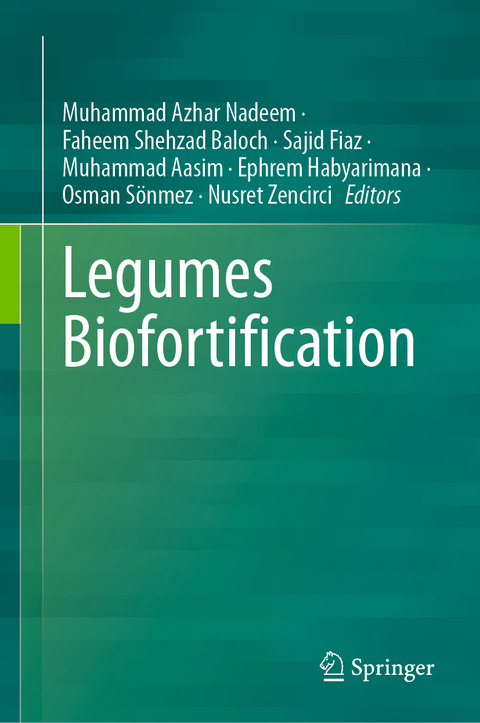
Legumes Biofortification
Springer International Publishing (Verlag)
978-3-031-33956-1 (ISBN)
This book summarizes the biofortification of legumes. Detailed information through contributed chapters shed light on legumes research relevant to human health, with key topics that include genomic and genetic resources for food security, conventional and modern breeding approaches for improving nutrition, agronomic traits and biotechnological interventions.
lt;b>Dr. Muhammad Azhar Nadeem is working as an Associate Professor of plant breeding and genetics at Sivas University of Science and Technology, Sivas, Turkey. His PhD thesis was entitled "Identification of Genomic Regions for Various Agronomic Traits in Turkish Common Bean Germplasm with Genome-Wide Association Studies (GWAS)". He is currently engaged in research activities involving genetic diversity assessment, genome-wide association studies (GWAS) for the identification of genomic regions, and their validation through KASP assay for marker-assisted breeding. Dr. Nadeem is focusing to perform GWAS in legumes, especially in common bean and lentil, and performing activities through national and international projects to identify genomic regions in these crops associated with mineral elements that will be helpful for the biofortification of these crops. He has a good number of publications in world-renowned and prestigious journals. He serves as an editorial board member of BMC Plant Biology, BMC Genomic Data, BMC Research Notes, Agriculture-MDPI, Plants-MDPI, Physiologia Plantarum, Frontiers in Plant Science, Molecular Biology Reports, Genetic Resources and crop evolution and Pakistan Journal of Botany. He has co-edited 1 book and written over 10 book chapters on important aspects of molecular genetics in relation to plant species. He has a good number of citations (1427) as per Google Scholar with an h-Index of 17.Dr. Faheem Shehzad Baloch is working as Associate Professor of plant breeding and genetics at Sivas University of Science and Technology, Sivas, Turkey. He received his Ph.D. with a dissertation on 'QTL mapping in wheat' from the faculty of agriculture, University of çukurova, Adana, Turkey in 2012 with a joint fellowship of Turkish ministry of education and Turkish scientific and Technological council of Turkey (TÜBITAK). In 2013, he started to work as assistant professor at Nigde ÖmerHalis Demir university, Nigde Turkey. In 2015, he joined Bolu Abant izzet Baysal Bolu, Turkey as Assistant professor. In 2018, he promoted to associate professor in the same institute. In August 2020, he joined Sivas university of science and Technology as associate professor and currently working in the same university. Dr. Faheem has more than 9 years of teaching and research experience in the plant phenomes, genetics and genomics, biotechnology specially in next generation sequencing (NGS) and DNA molecular markers in plant genetics for germplasm characterization, identification of genomic regions for traits of agricultural interest, development and validation of molecular markers for their use in marker assisted selection, and genomic prediction for plant improvement program particularly cereals and legumes and also for developing strategies for preserving this precious germplasm from Türkiye, which is the hot spot of biodiversity for most of agricultural crops and also thousands of endemic species. He leaded and participated in many projects funded by national and international organizations. He supervised and co-supervised MSC, PhD and post doc candidates from various countries. He participated in many international trainings on plant molecular genetics particularly at ICARDA-Syria, Cophenhagon University -Denmark, Minnesota University-USA. He has over 100 publications in Web of Sciences database. He has co-edited 6 books and written over 14 book chapters on important aspects of molecular genetics in relation to plant species. He has extensive array of citations with over 3000 times as per google scholar with an h-Index of 29. Dr. Baloch is active member of various COST action and also serve as Editorial board member of several impacted journals such as Turkish journal agriculture and forestry, BMC Genomic data, Agronomy Journal. Biotechnology and Biotechnological Equipment, BMC Plant Biology, and guest editor for special issues in different journals and also reviewer for more than 55 peer-review
Chapter. 1. Introduction to biofortification and challenges for nutrition security.- Chapter. 2. Nutritional Security Approaches for Legumes Bio fortification-A major Challenge.- Chapter. 3. Micronutrients enrichments in legumes through agronomic and cultural practices.- Chapter. 4. General aspects of genetic improvement (traditional and transgenic methods) aiming at Food Biofortification.- Chapter. 5. Contribution of Conventional Breeding Approaches in Legumes Biofortification.- Chapter. 6. Contribution of Biotechnological Approaches for Micronutrients Improvements in Legumes.- Chapter. 7. Nutritional enrichment in legumes through OMICs approaches.- Chapter. 8. How Genome Editing can be helpful in the Biofortification of Legume.- Chapter. 9. Transgenic Strategies and genome editing Towards Nutritional Enrichment.- Chapter. 10. Biofortification of Legume Hybrids Obtained Through Intergeneric Hybridization.- Chapter. 11. The Importance of Plant Growth-Promoting Rhizobacteria in TheBiofortification of Legumes.- Chapter. 12. Plant-microbe interaction for legume bio-fortification: Present status and future challenges.- Chapter. 13. Improving iron nutrition in legumes to overcome hidden hunger.- Chapter. 14. Bio-fortification of zinc in legumes to alleviate the zinc deficiency.- Chapter. 15. Organic approaches towards iron and zinc biofortification in legume Crops.- Chapter. 16. Legumes Biofortification for Selenium Contents.- Chapter. 17. Iodine biofortification of legumes.- Chapter. 18. Enriching Legumes Protein Contents and Essential Amino Acid.- Chapter. 19. Enriching legume protein contents.- Chapter. 20. Bio-molecular Aspects of Plant Nutrition Related to Food Biofortification.- Chapter. 21. Medicinal legumes in Turkey: a gift of nature for bios.- Chapter. 22. Variability in the biofortification properties of fenugreek (Trigonella foenum-graecum L.).- Chapter. 23. Biofortification: Lesson from the Past and Strategies for Future Food Security.
| Erscheinungsdatum | 09.11.2023 |
|---|---|
| Zusatzinfo | XVI, 549 p. 1 illus. |
| Verlagsort | Cham |
| Sprache | englisch |
| Maße | 155 x 235 mm |
| Gewicht | 1009 g |
| Themenwelt | Naturwissenschaften ► Biologie ► Botanik |
| Schlagworte | Agronomic strategies • Enhanced Nutrition • food security • hidden hunger • Omics approaches |
| ISBN-10 | 3-031-33956-8 / 3031339568 |
| ISBN-13 | 978-3-031-33956-1 / 9783031339561 |
| Zustand | Neuware |
| Informationen gemäß Produktsicherheitsverordnung (GPSR) | |
| Haben Sie eine Frage zum Produkt? |
aus dem Bereich


